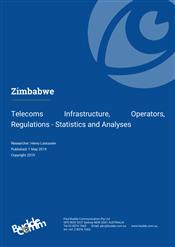Zimbabwe - Telecoms Infrastructure, Operators, Regulations - Statistics and Analyses

Last updated: 2 May 2019 Update History
Report Status: Archived
Report Pages: 64
Analyst: Henry Lancaster
Synopsis
Zimbabwe’s economy has seen a downturn since the fractious elections of July 2013, resulting in a significant fall in GDP growth until recovery returned in 2017. The contribution to GDP from the telecom sector fell steadily as a result. Sector revenue has also come under pressure from a number of recent regulatory measures and taxes imposed by the cash-strapped government. Nevertheless, the telecom sector shows some promise, particularly from the mobile sector where active mobile penetration has increased rapidly, reaching 93% by early 2019. The three mobile network operators Econet Wireless, NetOne and Telecel Zimbabwe continue to invest in network upgrades to support data services and their fast-expanding m-commerce and m-banking facilities. Telecel was recently acquired by the government from VEON, and the financial demands required for investment has jeopardised resources potentially available to the incumbent telco TelOne, (formerly PTC), which still holds a de-facto monopoly on fixed-line services in the country.
The government in April 2019 outlined its plans to merge TelOne and NetOne and sell off a majority stake in the operator as part of a wider plan to offset state debt.
Limitations in international bandwidth for the landlocked country for many years held back development of the internet and broadband sectors, but this has changed after fibre optic links to several submarine cables were established via neighbouring territories. The expansion of 3G mobile broadband services across the country, and the more recent efforts to extend LTE services, have meant that more than half of the population now has access to the internet. The first commercial LTE services were launched in 2013, while investment in LTE technologies, for which the regulator has assigned spectrum in the 700MHz band, continues. In addition, since mid-2018 the government and regulator have considered implementing a technology-neutral regime in a bid to ease licensee investment in emerging technologies, including 5G.
Key developments:
- Government planning TelOne with NetOne and selling a majority stake in the two;
- Draft legislation issued to repeal Post and Telecommunications Act;
- Regulator proposes to create a new Virtual Network Operator (VNO) license category;
- Telcos agree to the government's infrastructure sharing policy;
- VEON sells debt-laden unit Telecel to state-owned ISP Zarnet for $40 million;
- Renegotiated USF contribution hampering the regulator's ability to resource $62 million in mobile and broadband projects;
- Report update includes the regulator's market data to December 2018, telcos' operating and financial data to August 2018, Telecom Maturity Index charts and analyses, recent market developments.
Companies mentioned in this report:
TelOne, NetOne, Econet, Telecel, TeleAccess, Afritell, Liquid Telecom, DataOne, Powertel Communications, Telco Internet, Broadlands Networks, Aquiva, Africa Online, ComOne, Ecoweb, iWay Africa (MWEB), Zimbabwe Online (ZOL), Zimbabwe Internet Service Provider Association (ZISPA), Telecontract, Dandemutande (uMax), Aptics.
Related Reports
- Africa - Fixed Broadband Market - Statistics and Analyses
- Zimbabwe - Telecoms, Mobile and Broadband - Statistics and Analyses
- 2019 Africa - Mobile Network Operators and MVNOs
- Ethiopia - Telecoms, Mobile and Broadband - Statistics and Analyses
- Morocco - Telecoms, Mobile and Broadband - Statistics and Analyses
- Namibia - Telecoms, Mobile and Broadband - Statistics and Analyses
- Madagascar - Telecoms, Mobile and Broadband - Statistics and Analyses
- Benin - Telecoms, Mobile and Broadband - Statistics and Analyses
- Cameroon - Telecoms, Mobile and Broadband - Statistics and Analyses
- Eritrea - Telecoms, Mobile and Broadband - Statistics and Analyses
Share this Report
TMT Intelligence
A platform to scale your intelligence tasks
Monitor critical insights with our AI-powered Market Intelligence Platform gathering and analyzing intelligence in real time. With AI trained to spot emerging trends and detect new strategic opportunities, our clients use TMT Intelligence to accelerate their growth.
If you want to know more about it, please see:
Research Methodology
BuddeComm's strategic business reports contain a combination of both primary and secondary research statistics, analyses written by our senior analysts supported by a network of experts, industry contacts and researchers from around the world as well as our own scenario forecasts.
For more details, please see:
More than 4,000 customers from 140 countries utilise BuddeComm Research
Are you interested in BuddeComm's Custom Research Service?
Hot Topics
News & Views
Have the latest telecommunications industry news delivered to your inbox by subscribing to BuddeComm's weekly newsletter.